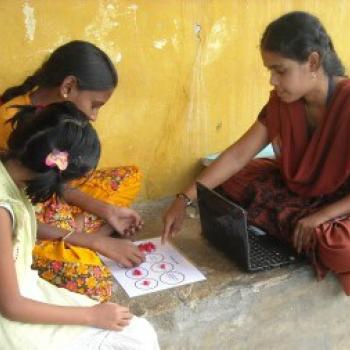
New Delhi, May 21, 2015: Young Lives India conducted a research symposium on gender and adolescence today. The symposium witnessed the coming together of international and national experts, academics and policy makers working on issues of gender and adolescence. The experts shared their views on the research findings from Young Lives and discussed recommendations in the context of policy implementation.
Speaking from a comparative study done on adolescents in India, Vietnam, Peru and Ethiopia, Dr. Kirrily Pells, Policy Officer, Young Lives UK said that,
“The poorest girls are the most likely to have married and had a child before the age of 18. We find that young women are predominantly disadvantaged in Andhra Pradesh and are 16 percentage points less likely to be studying than young men by the age of 19. It is also interesting to note that there are risks of sexual assault and safety for girls who travel longer distances from home to study in secondary schools.”
A recent working paper on the determinants of secondary school completion by Dr. Renu Singh and Protap Mukherjee of Young Lives India confirms that completion of secondary education in the country is biased towards boys, with many more girls discontinuing their education due to various reasons including familial, societal and school related issues such as distance of secondary schools in rural areas.
In a presentation on factors influencing early marriage in Ethiopia, Alula Pankhurst, Country Director of Young Lives Ethiopia observed that India scores the highest when it comes to women marrying by age 19. The other three countries surveyed were Ethiopia, Peru and Vietnam.
His research suggests that early marriage results from a complex interplay between community, household and individual factors. Although the occurrence of early marriage is partly linked to poverty, family circumstances notably parental death and illness also matter. It is linked to poor educational progression and high drop-out rates. Early marriage can also be an escape route from family pressures and overwork.
The research symposium reinforced the need to consider how gender and poverty interact when analysing inequalities among adolescents and called for policy interventions that address the school dropout rates in adolescents. The experts present at the symposium suggested that more flexible school hours and a safer school environment for adolescent girls might be the way forward.
For more information, contact:
Pari Trivedi, Research Communications Coordinator, Young Lives India
Phone number: +91-987 349 5994 Email: pari.trivedi@savethechildren.in

New Delhi, May 21, 2015: Young Lives India conducted a research symposium on gender and adolescence today. The symposium witnessed the coming together of international and national experts, academics and policy makers working on issues of gender and adolescence. The experts shared their views on the research findings from Young Lives and discussed recommendations in the context of policy implementation.
Speaking from a comparative study done on adolescents in India, Vietnam, Peru and Ethiopia, Dr. Kirrily Pells, Policy Officer, Young Lives UK said that,
“The poorest girls are the most likely to have married and had a child before the age of 18. We find that young women are predominantly disadvantaged in Andhra Pradesh and are 16 percentage points less likely to be studying than young men by the age of 19. It is also interesting to note that there are risks of sexual assault and safety for girls who travel longer distances from home to study in secondary schools.”
A recent working paper on the determinants of secondary school completion by Dr. Renu Singh and Protap Mukherjee of Young Lives India confirms that completion of secondary education in the country is biased towards boys, with many more girls discontinuing their education due to various reasons including familial, societal and school related issues such as distance of secondary schools in rural areas.
In a presentation on factors influencing early marriage in Ethiopia, Alula Pankhurst, Country Director of Young Lives Ethiopia observed that India scores the highest when it comes to women marrying by age 19. The other three countries surveyed were Ethiopia, Peru and Vietnam.
His research suggests that early marriage results from a complex interplay between community, household and individual factors. Although the occurrence of early marriage is partly linked to poverty, family circumstances notably parental death and illness also matter. It is linked to poor educational progression and high drop-out rates. Early marriage can also be an escape route from family pressures and overwork.
The research symposium reinforced the need to consider how gender and poverty interact when analysing inequalities among adolescents and called for policy interventions that address the school dropout rates in adolescents. The experts present at the symposium suggested that more flexible school hours and a safer school environment for adolescent girls might be the way forward.
For more information, contact:
Pari Trivedi, Research Communications Coordinator, Young Lives India
Phone number: +91-987 349 5994 Email: pari.trivedi@savethechildren.in

